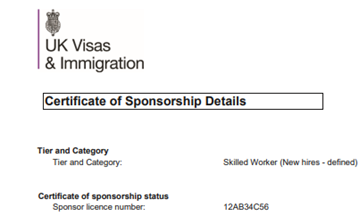The UK Government has officially published its Immigration White Paper (May 2025), outlining a new direction for migration policy designed to reduce net migration, strengthen domestic workforce development, and crack down on exploitation.
This new framework is especially relevant to adult social care providers, who have increasingly relied on international recruitment in recent years to fill chronic labour shortages. The White Paper introduces stricter eligibility rules, raises compliance expectations for sponsors, and signals a renewed focus on building a sustainable domestic workforce.
At Borderless, we've reviewed the full text of the White Paper and highlighted the most important points that care employers need to understand.
Join our upcoming webinar for a deeper discussion of the policy, sector-specific impacts, and your options moving forward.
1. Overseas Recruitment for Care Workers to End
Perhaps the most immediate and dramatic change: the Health and Care Worker visa route for care workers will close to new overseas applicants.
Key Details:
- Only in-country visa extensions and switching will be allowed, until 2028.
- New care workers from abroad will not be eligible to apply for UK visas.
- The closure follows widespread reports of abuse, exploitation, and underpayment within the social care sector.
2. Higher English Language Requirements for Care Workers
The government has confirmed a rise in the minimum English language requirement:
- Previous level: B1 (equivalent to GCSE)
- New requirement: B2 (equivalent to A-Level)
This change applies to all new Skilled Worker visa applicants and is expected to disproportionately affect the social care sector, where many candidates currently meet B1 but would struggle to achieve B2 without additional training.
What this means for social care:
- Fewer international candidates may qualify unless they undergo formal English instruction.
- Employers may need to fund or support English language training programmes.
- You should begin revising job descriptions and pre-screening tools now to align with this change.
3. A More Selective and Controlled Immigration System
The White Paper affirms a move toward a more selective system that prioritises higher-paid, higher-skilled roles.
For roles below RQF Level 6—such as most care roles—there will be:
- Increased scrutiny during application reviews
- Stricter salary thresholds (with fewer discounts)
- A greater emphasis on "public interest" justifications
Impact on care providers:
- Entry-level and lower-paid care roles may no longer meet visa eligibility criteria.
- You may need to review job titles, salary levels, and job codes (SOC codes) to ensure compliance.
4. Mandatory Domestic Workforce Investment
A major focus of the White Paper is reducing long-term reliance on international workers. To continue sponsoring overseas staff, employers may be required to demonstrate:
- Participation in government-recognised training schemes
- Evidence of apprenticeships and domestic hiring initiatives
- A long-term workforce strategy
For social care employers:
- If you cannot demonstrate commitment to hiring and training UK-based staff, your ability to sponsor care workers could be suspended or removed.
- You should begin documenting training investments and engaging with UK talent pipelines now.
Understand your obligations—join the webinar to prepare your care organisation.
5. Salary Thresholds and Shortage Occupation Discounts Scrapped
The Immigration Salary List is being abolished.
Highlights:
- All job roles must now meet standard salary thresholds, without discounts for shortage occupations.
- Care workers will likely be priced out unless the sector dramatically increases pay.
- Visa eligibility for dependants will also now depend on meeting higher income levels.
Automate Home Office Audits with Borderless
The Borderless platform provides a centralized system for all sponsorships, automating reminders for key tasks and ensuring best practices across your organization, simplifying audit preparation and ongoing compliance.
6. Sponsor Licence Penalties for Non-Compliance
The Government has tripled enforcement actions against unscrupulous sponsors, and plans to revoke licences for those not meeting higher standards. The Home Office will increase enforcement and revoke licences from sponsors who:
- Exploit visa holders
- Fail to offer fair pay and working conditions
- Do not invest in UK workers
For social care providers:
- Care agencies, in particular, will face greater scrutiny following media reports of abuse and non-compliance.
- Employers must maintain audit-ready documentation, including right-to-work records, pay data, and training logs.
Book a demo with Borderless to see how our compliance platform can reduce your risk.
7. Settlement and ILR to Take Longer
Previously, many care workers became eligible for Indefinite Leave to Remain (ILR) after five years. Now, the White Paper proposes that those with significant absences will face a new 10-year pathway.
Implications for care providers:
- Care workers who travel home frequently (e.g., to visit family) may not qualify for ILR in five years.
- This could affect long-term retention and workforce stability.
Employers should track employee absences more closely and help staff understand the implications of time spent abroad.
Attend Our Webinar: Unpacking the White Paper in Detail
Join Borderless and our panel of immigration experts for a comprehensive review of the 2025 Immigration White Paper and what it means for social care employers.
We will cover:
- The closure of the Health and Care visa for new applicants
- New compliance expectations for care providers
- How to prepare your sponsor licence and workforce strategy
Final Thoughts
The 2025 Immigration White Paper marks a turning point for care providers. With more restrictive policies, reduced access to overseas labour, and tougher compliance rules, the social care sector must move quickly to adjust its workforce strategy.
Borderless can help you adapt. Our platform is built for care providers—automating compliance, tracking licence duties, and preparing you for Home Office scrutiny.
- Join our webinar for expert analysis
- Contact our team for tailored sponsor licence support
- Subscribe to the blog for ongoing updates






